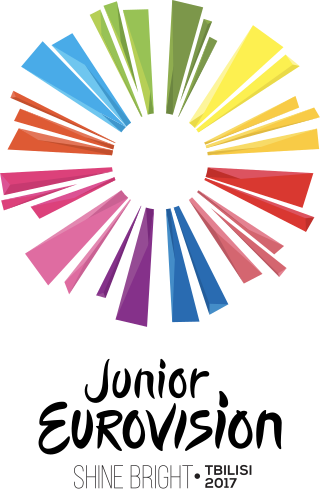
The Eurovision Young Dancers, often shortened to EYD, or Young Dancers, was a biennial dance competition, organised by the European Broadcasting Union (EBU) and is broadcast on television throughout Europe. Thirty-seven countries have taken part since the inauguration of the contest in 1985; including Kosovo and Canada.

Switzerland has participated in the Eurovision Song Contest 63 times since making its debut at the first contest in 1956, missing only four contests, in 1995, 1999, 2001 and 2003. Switzerland hosted the first contest in 1956 in Lugano, and won it. Switzerland won the contest again in 1988, with the 1989 contest being held in Lausanne.
Eurovision is a pan-European television telecommunications network owned and operated by the European Broadcasting Union (EBU). It was founded in 1954 in Geneva, Switzerland, and its first official transmission took place on 6 June 1954. However, a year before the official launch, on 2 June 1953 the coronation of Elizabeth II was one of the first events to be broadcast across Europe.

Malta has entered the Junior Eurovision Song Contest eighteen times since debuting at the first contest in 2003. Maltese broadcaster PBS has been responsible for the country's participation, and organises a televised national final to select the country's entrant. Malta did not participate in 2011 and 2012, and selected the entrant internally instead of using a national final in 2013 and 2014.

Belarus has participated in the Junior Eurovision Song Contest in every edition since its inception in 2003 until 2020. The Belarusian Television and Radio Company (BTRC), then a member organisation of the European Broadcasting Union (EBU), has been responsible for the selection process of its participants since its debut. The country hosted the contest at the Minsk-Arena in 2010 and again in 2018.

Poland has entered the Junior Eurovision Song Contest nine times, competing in the first contest in 2003. The Polish broadcaster Telewizja Polska (TVP) decided to withdraw from the contest after coming last in both 2003 and in 2004, despite TVP signing a 3-year contract with the European Broadcasting Union (EBU). In 2016, it was announced that Poland would return after an 11-year break. Poland is the first country in the history of the Junior Eurovision Song Contest to win twice in a row: in 2018 with Roksana Węgiel and her song "Anyone I Want to Be" and then in 2019 with Viki Gabor and her song "Superhero".

The participation of Portugal in the Junior Eurovision Song Contest first began at the Junior Eurovision Song Contest in 2006 which took place in Bucharest, Romania. Rádio e Televisão de Portugal (RTP), a member of the European Broadcasting Union (EBU), were responsible for the selection process of their participation. Portugal used a national selection format, broadcasting a show entitled "Festival da Canção Junior", for their participation at the contests. This was a junior version of Festival da Canção, the national music competition organised by broadcaster RTP to choose the Portuguese entry for the Eurovision Song Contest. The first representative to participate for the nation at the 2006 contest was Pedro Madeira with the song "Deixa-me sentir", which finished in second-last place out of fifteen participating entries, achieving a score of twenty-two points. Their worst result to date has been achieved by Rita Laranjeira with her song "Gosto de tudo " in the Junior Eurovision Song Contest 2018 where she placed 18th. Portugal withdrew from competing in 2008, and returned in 2017. They withdrew again in 2020 due to the COVID-19 pandemic. Portugal returned in 2021, where they achieved 11th place, their best result up to that point. In 2022 the country surpassed this record and reached 8th place.

France has participated in the Junior Eurovision Song Contest seven times, debuting in Lillehammer, Norway, at the Junior Eurovision Song Contest 2004. France Télévisions, a member organisation of the European Broadcasting Union (EBU), is responsible for the selection process of their participation. The first representative to participate for the nation was Thomas Pontier with the song "Si on voulait bien", which finished in sixth place out of eighteen participating entries, achieving a score of seventy-eight points. France did not participate after 2004, and made its return to the contest in 2018, 14 years later. France has won the contest on two occasions: in 2020, with Valentina and the song "J'imagine", and in 2022, with Lissandro and the song "Oh maman!".

The Eurovision Young Musicians, often shortened to EYM, or Young Musicians, is a biennial classical music competition for European musicians that are aged between 12 and 21. It is organised by the European Broadcasting Union (EBU) and broadcast on television throughout Europe, with some countries holding national selections to choose their representatives for the contest.

Germany debuted at the Junior Eurovision Song Contest 2020 in Warsaw, Poland. KiKa, the children's channel jointly owned by European Broadcasting Union (EBU) members ARD and ZDF, is responsible for the country's participation. Germany finished last place on their debut in 2020, when Susan Oseloff represented the country with "Stronger with You". For the 2021 competition, KiKa selected Pauline with the song "Imagine Us".

The participation of Slovenia in the Junior Eurovision Song Contest first began at the twelfth edition of the Junior Eurovision Song Contest in 2014 which took place in Marsa, Malta. Radiotelevizija Slovenija (RTVSLO), a member organisation of the European Broadcasting Union (EBU), were responsible for the selection process of their participation. Slovenia originally used an internal selection format for their participation at the 2014 contest. The first representative to participate for the nation at the 2014 contest was Ula Ložar with the song "Nisi sam ", which finished in twelfth place out of sixteen participating entries, achieving a score of twenty-nine points. Slovenia participated for a second time at the 2015 contest in Sofia, Bulgaria. This time, RTVSLO organised a children's spin-off of their Eurovision national final EMA to select their entry. Lina Kuduzović represented the nation with the song "Prva ljubezen". She finished in third place overall, achieving Slovenia's highest placing in both the adult and junior Eurovision Song Contest. Slovenia withdrew from the contest in 2016, citing that the decision was made based on changes to the contest rules by the EBU, although not specifying which rule changes influenced their decision to withdraw from the competition. Despite originally expressing an interest to return to the 2022 contest in Yerevan, Armenia, the plans did not flourish and Slovenia is yet to return to the event.

Austria has participated in the biennial classical music competition Eurovision Young Musicians 18 times since its debut in 1982 and is the most successful country in the contest, with a total of five wins. Austria has hosted the contest a record six times, in 1990, 1998, 2006, 2008, 2010 and 2012.

Poland has participated in the Eurovision Young Musicians 12 times since its debut in 1992 and has won the contest three times to date. Poland hosted the contest in 1994.

Ireland has participated in the Junior Eurovision Song Contest seven times since their first appearance at the 2015 contest. Irish-language broadcaster TG4 has been responsible for the country's participation in the contest, and organises a televised national final Junior Eurovision Éire to select the Irish entries. TG4 did not participate in 2020 due to the COVID-19 pandemic, but returned to the contest in 2021.

The Eurovision Young Dancers 2017 was the fifteenth and final edition of the Eurovision Young Dancers competition. The final took place at the Prague Congress Centre in the Czech capital, Prague on 16 December 2017. This was the second consecutive time that the Czech national broadcaster, Česká televize (ČT), organised the contest. The event is aimed at young dancers aged between 16 and 21, competing in modern dances, be it solo or in couples, as long as they were not professionally engaged.

The Junior Eurovision Song Contest 2016 was the fourteenth edition of the annual Junior Eurovision Song Contest, which took place at the Mediterranean Conference Centre, in Valletta, Malta. This was the second time that Malta have hosted the Junior Eurovision Song Contest, their first being in 2014. Jon Ola Sand was appointed as the Executive Supervisor for the 2016 Junior Eurovision Song Contest, following the dismissal of the former supervisor, Vladislav Yakovlev.

The Junior Eurovision Song Contest 2017 was the fifteenth edition of the annual Junior Eurovision Song Contest, organised by the Georgian Public Broadcaster (GPB) and the European Broadcasting Union (EBU). It took place on 26 November 2017 at the Olympic Palace, in the Georgian capital, Tbilisi. This was the fifth time that the contest was hosted by the previous year's winning country. The visual design and contest slogan, "Shine Bright", were revealed in May 2017.

The Eurovision Young Musicians 2018 was the nineteenth edition of the Eurovision Young Musicians contest. It was hosted by the United Kingdom, for the first time since the inaugural contest in 1982. This edition was a co-production between the European Broadcasting Union (EBU), the Edinburgh International Festival and the British Broadcasting Corporation (BBC) as host broadcaster. Musicians representing eighteen countries with EBU membership participated in the contest, with Albania making their debut alongside seven returning countries, while Austria decided not to participate for the first time.

The Junior Eurovision Song Contest 2019 was the seventeenth edition of the annual Junior Eurovision Song Contest, organised by Telewizja Polska (TVP) and the European Broadcasting Union (EBU). It was held on 24 November 2019, at the Gliwice Arena in Gliwice, Poland, following the country's victory at the 2018 contest in Minsk, Belarus, with the song "Anyone I Want to Be", performed by Roksana Węgiel. It was the first time Poland had hosted the contest, as well as the first Eurovision event to be held in the country since the Eurovision Young Dancers 2013.

The Junior Eurovision Song Contest 2020 was the 18th edition of the annual Junior Eurovision Song Contest, organised by Telewizja Polska (TVP) and the European Broadcasting Union (EBU). The contest took place on 29 November 2020, and was held in Warsaw, Poland, following the country's victory at the 2019 contest with the song "Superhero" by Viki Gabor. This was the first time the contest was held in the same country for two consecutive years.


















